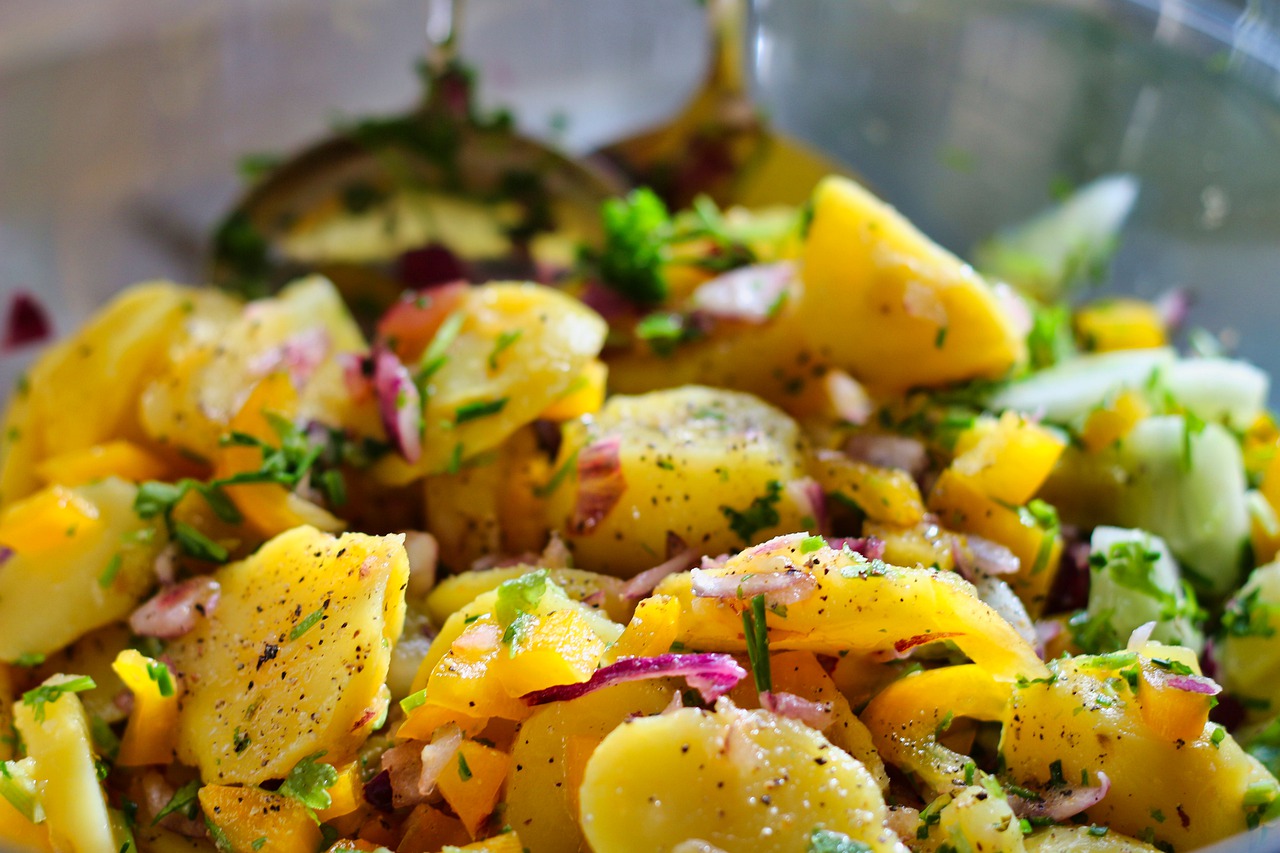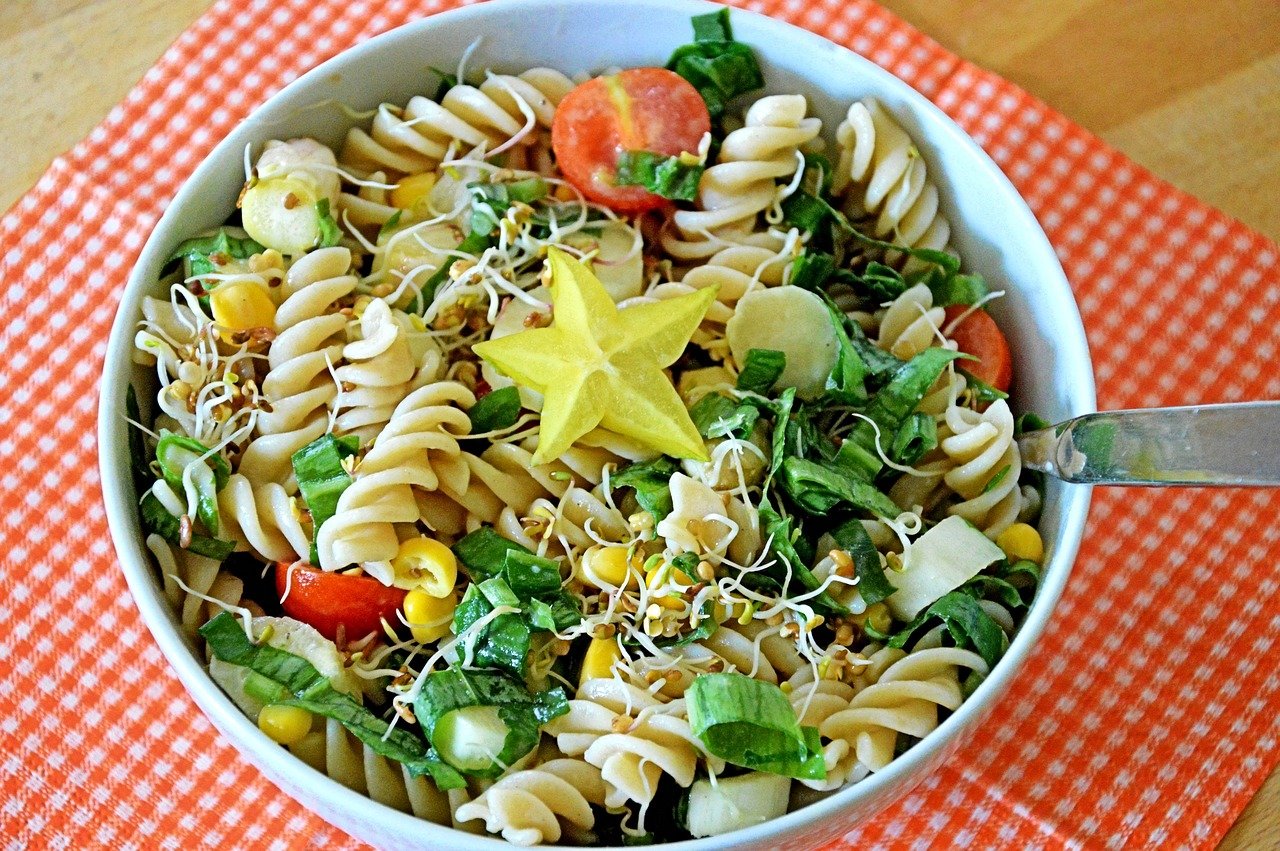Salad is probably the first issue that comes to mind when thinking of a low-calorie dinner or side dish. But, on the other hand, salads’ calorie content can vary significantly due to the variety of salad garnishes, ingredients, and dressings available.
In comparison to other salads, macaroni salad is rich in calories. When concerned about calories and fat, you should always read the nutrition information label while eating macaroni salad.
According to some dietitians, the more complex carbohydrates present in potatoes make them a preferable option to pasta. On the other hand, potatoes and pasta are heavy in complex carbs, which should be the cornerstone of any healthy diet.
This salad has pasta, mayonnaise, celery, onions, peppers, and pickles. Pasta salad has less protein and more carbohydrates than other mayo-based salads.
Carbohydrates are an essential part of pasta salad. Per serving of macaroni and cheese salad, there are 3 grams of fiber, 1 gram of sugar, and 53 grams of carbohydrates. However, because it contains only 9 grams of protein, macaroni salad is not high-protein.
The manner of cooking pasta has a significant impact on its digestion. As a result, the calories in pasta will react differently, relying on the cooking technique employed.
If the pasta has some resistance when bitten, it is considered al dente. Because the starch particles aren’t broken down, digestion is slower, and energy release is delayed.
Which Is Healthier: Pasta or Potatoes?
Some dietitians say that potatoes are healthful than pasta because they contain more complex energy-providing carbs. However, pasta and potatoes are high in complex carbs, which should be the foundation of any well-balanced diet.
The key to enjoying a plate of potatoes is to limit the portion size and pair it with cheeses, veggies, and low-fat dairy. It is also preferable to select the necessary forms that include more fiber, which produces a more wonderful feeling of satiety and regulates blood glucose and cholesterol levels.
Complex carbs should never be avoided in the diet. They gradually give you energy, which helps maintain your body’s glucose levels and eliminates the dreaded “hunger attacks.” To reap the benefits of its qualities, keep in mind that how you prepare complex carbohydrate-rich foods has a significant impact on the calories they give and how your body absorbs these nutrients.
The way you prepare the potatoes has an enormous impact on the calories they supply you when you consume them. Take note of the significant change in calories when boiling 100 grams of potatoes, depending on the method employed.
Not all potatoes are created equal. The difference is not only in the amount of energy they provide but also in how they are cooked their satiating power—they are not the same as boiled and then fried potatoes. The reason for this is that their glycemic indexes differ, and their sugars behave as either accelerated or “slow” carbs.
Does Potato Salad Make You Gain Weight?

Although traditional potato salad has fewer calories than pasta salad, the mayonnaise increases the saturated-fat level. But potato salad has one advantage over pasta salad: it’s almost entirely vegetables.
When consumers order anything with the term “salad” in the title, they usually expect that the item delivered in front of them would be nutritious and low-calorie. However, this is not always the case, particularly with American franchise restaurants.
Heartier salads that don’t include greens as a critical element, such as chicken and potato salads, are very high on the fatty salad scale. Most traditional potato salads fall under the group of salads that are decidedly unhealthy.
Many people swear that potatoes are their nemesis and that eating them would prevent them from losing weight. This is especially true for bodies on a low-carbohydrate diet for weight loss.
Not only that, but potatoes are blamed for various health issues such as high blood sugar or diabetes, hypertension, or high blood pressure. So true; if you have one of these disorders, your nutritionist or doctor will advise you to avoid eating potatoes.
Consuming potatoes may not result in weight gain if you usually follow a healthy diet and avoid excessive bad foods. However, because potatoes have a high nutritional profile, both white and sweet potatoes may weight loss.
A 100-gram piece of white potatoes has 77 calories, 2 grams of fiber, and 2 grams of protein. They also have a high potassium content, necessary for muscular growth and blood pressure regulation.
If consumed in conjunction with a low-calorie and nutritious diet, potatoes may not cause weight gain or hinder weight loss. Furthermore, it is critical to prepare potatoes correctly and healthfully to prevent increasing calories and bad fats.
How Many Calories Are in a Pasta Salad?
Pasta salad can be made in an infinite number of healthy ways. However, while pasta salad is a popular dish, traditional recipes often include 500 calories per serving.
Pasta salad is a salad made with one or more types of pasta that is virtually always cooled and usually mixed in a mayonnaise-based dressing and oil. It is generally served as an appetizer, a side dish, or the main entrée. Pasta salad is commonly associated with spring and summer, but it may be performed at any time of year.
Compared to white pasta, whole-wheat pasta offers two grams of heart-healthy fiber every ounce of dried pasta. The amount of dry pasta, to begin with, is determined by the shape.
Pasta is, of course, synonymous with Italy, where it is taken extremely seriously. However, spaghetti salad is more American than Italian. Pasta is typically served hot and as a separate meal in Italy.
Pasta salad contains a lot of carbohydrates. One gram of sugar, one gram of fiber, and 53 grams of carbohydrates are found in one cup of macaroni salad. However, pasta salad is not a high-protein food, as it only includes roughly 9 grams of this nutrient.
Because pasta salad is the primary ingredient, it has a lower protein and carbohydrate content than other mayo-based salads. Adding hard-boiled eggs or chicken breast to each plate is a fantastic way to increase the amount of protein in each serving and complete your meal.
Salads are commonly considered healthy, weight-loss-friendly meals, yet their nutritional qualities and calorie levels vary greatly depending on the ingredients utilized. Choose green salads with loads of vegetables and a reliable source of protein to enhance the nutritional value of your meal.

